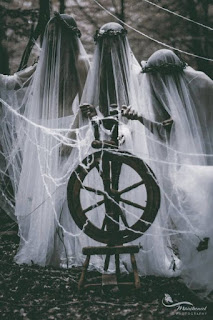Much analysis has been written about the U.S. presidential
election: those who were unwilling to look at the portents have expressed their
shock; fingers have pointed; victors have quickly gone from slightly astonished
to smugly confident and obnoxiously righteous, even vindictive.
You may have noticed I haven't done any analysis, or, indeed, said much of anything beyond an poetic almost-dirge published not long after.
You may have noticed I haven't done any analysis, or, indeed, said much of anything beyond an poetic almost-dirge published not long after.
 |
| by cjneasbi at "Deviant Art" |
The results weren't unthinkable. They were
completely thinkable. I take no comfort in knowing that. Not long ago, I
recalled Senator Margaret Chase Smith's horsemen of calumny. Alas, her faith in
the American people has been shattered, and the horsemen now are abroad, but it
must be said: their horrific grandeur is somehow diminished to shabby pettiness
by galloping to the regimented beat of 140 characters max!
Hannah Arendt wrote in Eichmann
in Jerusalem: The Banality of Evil (1963) of the concept of evil as
manifest in the banal. Her portrayal of Eichmann didn't reveal a malicious or
particularly anti-semitic character, but rather a person intent on advancing
his career by performing the orders he was given as effectively as possible; he
did his job, without questioning whether the job should be done. Arendt's
analysis wasn't without controversy, but it raised a disturbing spectre that
hovers in the background during this period of transition to a new presidential
administration.
Colin Marshall, writing in 2013 in The New Yorker on a biopic about Arendt, refers to a later article
by Rollo Romig. He looked at the nature of evil in the wake of the Aurora CO shootings. Rollo wrote: "The danger of a word like ‘evil’ is that it is
absolute.... ‘Evil’ has become the word we apply to perpetrators who we’re both
unable and unwilling to do anything to repair, and for whom all of our
mechanisms of justice seem unequal: it describes the limits of what malevolence
we’re able to bear. In the end, it’s a word that says more about the
helplessness of the accuser than it does the transgressor.”
In the current political realm, it seems to me that these
two views don't differ; rather, they combine. I don't think our new
president-elect is a grand villain; I think he's entirely amoral. We are told
by clusters of tweets that "winning" (as defined by the president-elect)
is all that matters; he's made clear that he speaks in hyperbole, that factual
truth is of no importance to him in public discourse. From this, I draw the
conclusion that expediency trumps legality and morality in the interest of the "win." (No pun intended--but
doesn't his name and its usage strike you as part of the surreal nature of this
entire situation?)
Trump differs from Eichmann in that the orders are his to
give, but the narrowness of his imagination and limits of his vision of success
translate into a consummate banality. Our government is being stage-managed as
an unscripted entertainment show (commonly called reality TV, but there's so
little reality to it that the use of the term is straight out of Orwell's 1984). Yet his very lack of awareness, his brazen
ignorance, his complete indifference to anything beyond himself, take us to the place where we're unable,
and half the country isn't even interested in, calling him out and holding him
accountable.
This is what breaks my heart: not that half the country was
fearful and angry and handed this man the key to the most powerful office in
the world (though we must grieve at the magnitude of this failure), but that those same people seem willing to let him do as he likes,
contrary to his promises, contrary to the general public interest, and contrary
to the rule of law. The dignity of the office, its power to seek the common
good, seem of no account to half our people, nor do the principles of dissent, or the value of diversity and open exchange of ideas. We stand in the rubble
of the shining city, wondering at the cracks that threaten its very
foundations.
Susan Neiman's Evil in Modern Thought (Princeton University Press: 2002) is also referenced in Romig's piece. She
writes that calling something evil "is a way of marking the fact that it
shatters our trust in the world." Romig expands on this, observing "Evil
is both harmful and inexplicable, but not just that; what defines an evil act
is that it is permanently disorienting for all those touched by it." If
evil is, in the modern world, essentially identified by its effect, then this
election has indeed unleashed evil upon us, 140 characters at a time....

















